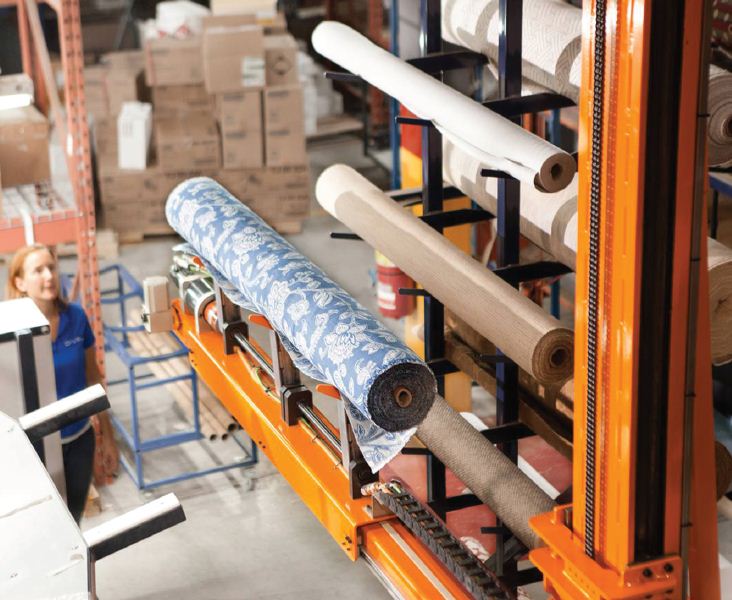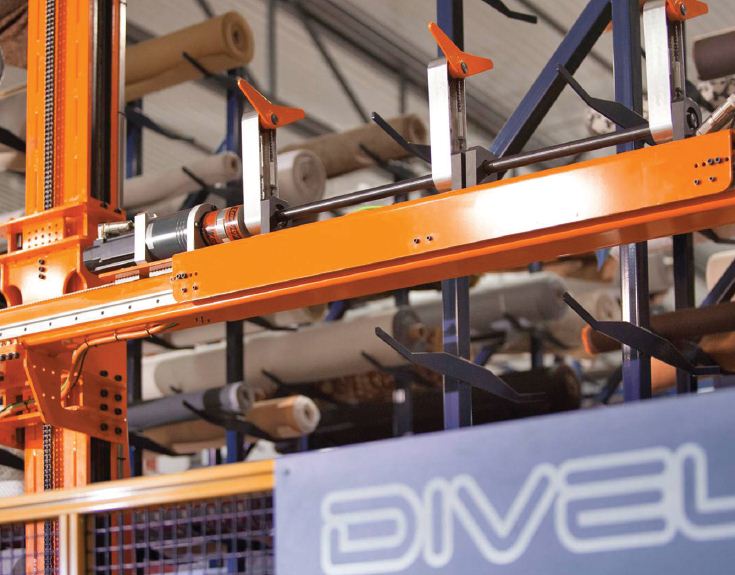
Material Handler
Staff
Motion Control Beckhoff AutomationPC-Based Control provides a lift for Canadian furniture manufacturer’s automated warehousing systems.
Modern e-commerce and the rapidly-changing world of merchandizing can put a huge strain on warehouse systems and personnel to ensure that the right products get into the hands of customers as quickly as possible. Staying in tune with new marketplace realities, while at the same time automating new processes, can add a significant level of complexity and essential planning.
This is where DIVEL, a provider of lifting and positioning equipment based in Louiseville, Québec, steps in to provide engineered solutions for operations seeking material handling and production modernizations. Founded over a decade ago, the company designs, fabricates and installs industrial positioning and lifting systems, as well as test benches for a wide range of industries.

The DIVEL Automated Fabric Storage System provides a fast, accurate solution for storage and utilization of fabric for Quebec-based furniture maker, Canadel.
To control the process from design to commissioning, each machine is specified, assembled and programmed in-house.
“DIVEL is fully committed to our customers, and our goal is to provide a seamless, turnkey industrial solution for any positioning and lifting need,” says Louis Lupien, president of DIVEL. “Features such as automated operation, user-friendly interfaces and a high degree of machine safety are just a few of the ways we separate ourselves from our competition.”
Automatic storage and transport
True to the company’s roots in furniture applications, one of its most impressive positioning and lifting applications is an automatic fabric storage system created for Louiseville, Quebec-based furniture manufacturer, Canadel.
Family-owned and operated since 1982, Canadel manufactures each piece of hand-assembled and finished solid birch furniture in North America and in an environmentally-friendly manner. In contrast to this traditional process, DIVEL’s advanced material handling system zips between the fabric storage racks interspersed throughout its modern warehouse.

A linear conveyor system transports fabric rolls from the racks to an automated cutter.
“High storage density, automated operation and minimal plant floor footprint were all key goals of Canadel for the new fabric storage system,” Lupien says. “Through integration of leading-edge control technologies and leveraging our years of manufacturing experience, we struck a perfect balance in terms of performance and form factor.”
The DIVEL system takes full advantage of the company’s extensive experience in lifting and positioning systems, integrating a complex network of motors, cables, chains and metal arms, all fitted together to create an easy-to-use method of fabric roll conveyance.
After the system removes the rolls of up to 100 pounds from large metal racks, it moves them back between the shelves and places them on the automated cutter. Without any intervention by the operator, the automated cutter removes the necessary length of fabric for the particular project and a precision cutting machine finalizes the shape of the material by trimming the fabric to the correct size for the application.
The DIVEL machine then returns the roll of unused fabric back into storage – again, an automated process needing little or no operator intervention. The entire procedure is documented by an inventory management system and tracked in a table for operator review.
In addition, the DIVEL system can autonomously add or remove fabric rolls from inventory, as dictated by production needs.
“Practical and efficient industrial solutions are at the core of the DIVEL value proposition,” says Jean-Sebastien Descôteaux, DIVEL operations director. “By ensuring exceptional user-friendliness on the machines and dramatically boosting throughput, we help customers streamline operations and increase production.”
PC Control
When exploring options for controls components, DIVEL had a myriad of requirements to check off before choosing a suitable vendor. Among these requirements was reduced assembly and programming time, integration of advanced programming methodologies, a variety of I/O signal types and reduced cabling requirements.
PC-based control hardware and software, along with the EtherCAT industrial Ethernet system, ultimately formed the ideal solution. In 2009, Beckhoff Automation became the standard automation and controls provider for DIVEL storage systems. To handle the HMI and controls processing, DIVEL integrated a Beckhoff CP6202 Panel PC, which combines a 15-inch touch screen with an Intel Celeron M 1.5 GHz processor. In each configuration, the Panel PCs of this series are approved for ambient temperatures between 0 and 55 °C, designed for installation in the front of a control cabinet. Functions handled by the processing system include full automation of the storage systems, data entry for manual roll storage feed and withdrawal, alarm annunciation, sequence display, interface for manual operation and axis displacement, as well as inventory display and control.
DIVEL also leverages a variety of TwinCAT functions in the overall control system. For example, the CP62xx with TwinCAT PLC control software automates the roll storage sequences. The TwinCAT PLC HMI library permits the design of graphical elements, such as onscreen push buttons, pilot lights, actual values monitoring, bar graphs and trends, among others. TwinCAT Modbus TCP Server is used to configure a communication path with the cutter for roll number orders and alarm advising.

A Beckhoff CP6202 Panel PC and HMI provides overall control and tracking for Canadel’s autonomous systems.
“The ability to use different programming languages, whether Function Block Diagram, Continuous Flow Chart, Structured Text, Sequential Flow Chart or others, represents a powerful advantage over other software options,” Descôteaux says. “All programming challenges can be easily solved using the appropriate language for the task at hand, thus reducing engineering and commissioning time. Built-in instructions and data conversion facilitate significant flexibility for data handling and management.”
AM3033 synchronous servomotors from Beckhoff are used in the motion system, providing accurate axis positioning and high torque. Powering these motors are AX52xx series 2-channel EtherCAT servo drives. These dual-axis drives enable operation of two motors with identical or different power ratings, up to a total current of 12A (2 x 6A) and a wide global voltage range of 100VAC -10% to 480VAC +10%. In addition, EtherCAT as the communication system enables interfacing with devices throughout the PC-based control system.
“In the fabric roll storage project, two axes of motion had to be used in master-slave mode, in order to create a linear movement with a rotary axis and another linear axis, due to tightness of space,” Descôteaux explains. “The compact form factor of the Beckhoff components was a welcome addition to combat the space-constrained nature of the project.”
Time and cost savings
Over the past five years of implementing Beckhoff technologies across their product lines, DIVEL has driven significant benefits.
“Since EtherCAT utilizes standard Ethernet cables, we were able to cut the number and cost of necessary cables along with the size of the cabling track, providing increased reliability,” Lupien says. “The ability of EtherCAT to pass the data from I/Os, the safety components and the motion system through one network, all without compromising response times, provides incredible advantages in our systems.”
Through the speed of EtherCAT, DIVEL realized significant cabling cost reductions, as well as reductions in commissioning time.
“On projects where the I/Os are installed a good distance away from the PC-based controller, EtherCAT saves us around 10 percent in time and material, when compared with traditional fieldbus cabling.”
He also notes that DIVEL was able to generate additional savings through a reduced machine footprint. “The compact size of PC-based control architectures helped us reduce the panel height by an impressive six inches, generating instant savings on each machine,” he adds. Descôteaux also highlighted the significant value found within EtherCAT connectivity and the TwinCAT development environment.
“The openness of the EtherCAT platform enables streamlined connectivity with the vast majority of popular fieldbuses as well as simple data collection for analysis of power quality and energy consumption, making it a powerful tool and welcome addition to our operations,” he said.
Data exchange with external databases is easy with the appropriate TwinCAT libraries, reducing programming time and effort, Descôteaux notes. “We’ve seen significant reductions in programming time using Twin- CAT,” he says. “The broad range of software tools helps reduce programming time by approximately 15 percent over code developed on previous platforms. And, when coupled with the built-in remote access capabilities that come standard with PC-based systems, we can provide customers a robust product to meet all of their needs.”
After the success of the first system at Canadel, DIVEL plans to make this new automated storage system a standard product offering. As part of these plans, the company says it will continue implementing Beckhoff PC-based control systems into their standard product lines.
“We have had an excellent experience with Beckhoff as a whole,” Lupien says. “DIVEL continues to generate considerable results with each new machine – whether with furniture, metalworking or any of the numerous industries served by our innovative product lines.”
